Armide (Lully)
Armide is an opera in five acts by Jean-Baptiste Lully. The libretto by Philippe Quinault is based on Torquato Tasso's poem La Gerusalemme liberata (Jerusalem Delivered). The work is in the form of a tragédie en musique, a genre invented by Lully and Quinault.

Critics in the 18th century regarded Armide as Lully's masterpiece. It continues to be well-regarded, featuring some of the best-known music in French baroque opera and being arguably ahead of its time in its psychological interest. Unlike most of his operas, Armide concentrates on the sustained psychological development of a character – not Renaud, who spends most of the opera under Armide's spell, but Armide, who repeatedly tries without success to choose vengeance over love.
Performance history
Armide was first performed on 15 February 1686 by the Paris Opera at the Théâtre du Palais-Royal, with scenery by Bérain, in the presence of the Grand Dauphin. The subject for the opera was chosen for Lully by King Louis XIV of France.[1] However, the king would not attend the première or any of the following performances,[2] possibly because Lully was involved in a homosexual scandal.[3] The opera was well received by the Parisians and was revived by the Paris Opera in 1703, 1713–14, 1724, 1746–47, 1761, and 1764.[4] Between 1686 and 1751 Armide was mounted in Marseilles, Brussels, Lyon, Lunéville and perhaps Metz, and was also produced abroad in The Hague, Berlin (with revisions by Carl Heinrich Graun) and apparently, in two concert performances, in Rome.[5]
Roles
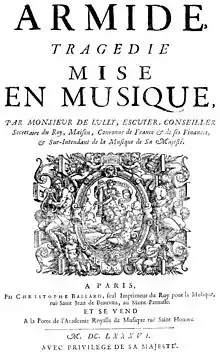
| Role | Voice type | Premiere cast,[2][5] 15 February 1686 (Conductor: Pascal Collasse) | |
|---|---|---|---|
| Allegorical Prologue | |||
| La Gloire [Glory] | soprano | ||
| La Sagesse [Wisdom] | soprano | ||
| Main Plot | |||
| Armide, magician, niece of Hidraot | soprano | Marie Le Rochois | |
| Renaud, a knight | haute-contre | Louis Gaulard Dumesny | |
| Phénice, a confidante of Armide | soprano | Marie-Louise Desmatins | |
| Sidonie, a confidante of Armide | soprano | Françoise Fanchon Moreau, la Cadette | |
| Hidraot, magician, King of Damascus | basse-taille (bass-baritone) | Jean Dun père[6] | |
| Aronte, guard of Armide's captive knights | basse-taille | ||
| Artémidor, a knight | taille (baritenor) | ||
| La Haine [Hatred] | taille | M. Frère | |
| Ubalde, a knight | basse-taille | ||
| The Danish Knight, companion of Ubalde | haute-contre | ||
| A Demon in the form of a Water Nymph | soprano | ||
| A Demon in the form of Lucinde, the Danish Knight's beloved | soprano | ||
| A Demon in the form of Melisse, Ubalde's beloved | soprano | ||
| Heroes who follow Glory; nymphs who follow Wisdom; people of Damascus; demons disguised as nymphs, shepherds and shepherdesses; flying demons disguised as Zephyrs; followers of Hatred, the Furies, Cruelty, Vengeance, Rage, etc.; demons disguised as rustics; Pleasures; demons disguised as happy lovers | |||
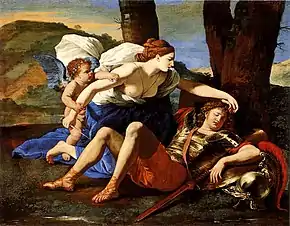
Synopsis
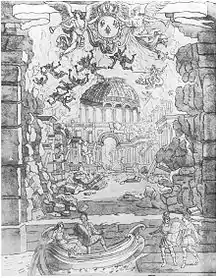
During the First Crusade, Armide ensnares her enemy the Christian knight Renaud with her magic spells. At the moment she raises her dagger to kill him, she finds herself falling in love with him. She casts a spell to make him love her in return. Upon returning to her castle, she cannot bear that Renaud's love is only the work of enchantment. She calls on the Goddess of Hate to restore her hatred for Renaud, but fails to escape from her feelings of love for him. The Goddess condemns Armide to eternal love. Before Armide can return to Renaud, two of his fellow soldiers reach Renaud and break Armide's spell. Renaud manages to escape from Armide, who is left enraged, despairing, and hopeless.
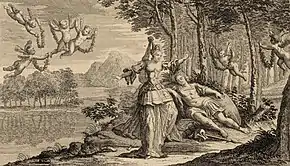
History and analysis
Roughly eight decades following Monteverdi's L'Orfeo, Jean-Baptiste Lully produced Armide with his longtime collaborator, playwright Jean-Philippe Quinault. Together they had developed the tragédie en musique, or tragédie lyrique, which served as a new form of opera that combined elements of classical French drama with ballet, the French song tradition, and a new form of recitative. Armide was one of Lully's last operas and is therefore extremely developed in style.
The opera's instrumental overture is divided into two parts, all with the same highly professional sound, as if to accompany the entrance of a highly revered authority. It is in fact, according to the Norton Anthology of Western Music, a "majesty suitable to the king of France, whose entrance into the theater the overture usually accompanied when he was in attendance".[7] At points it is playful and bouncy, while always remaining ceremonious. The first section of the overture is in duple meter and comparatively sounds slower than the second section, when the meter changes into compound. These two different styles switch off until the conclusion of the piece (in duple meter).
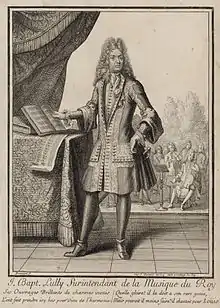
The most famous moment in the opera is Act II, scene 5, a monologue by the enchantress Armide, considered "one of the most impressive recitatives in all of Lully's operas".[7] Armide, accompanied by only continuo, alternates between glorying in her own power and succumbing to piercing angst. Clutching a dagger, she expresses her unyielding desire to kill the knight Renaud, who has foiled her plan to keep the knights of the Crusades in captivity. Though not elaborate in terms of orchestration, the techniques of dramatic interpretation of rhythm, impressive use of stressing on downbeats, and exaggerated use of rests beautifully complicate this piece.
Renaud had taken on the heroic and courageous duty of freeing these knights, much to the vexation of Armide, who now plans to murder him as quickly and swiftly as she can, while he is fast asleep under her magical spell. A stark sense of hesitation washes over her, and her voice grows softer and more full of doubt as she finds herself unexpectedly falling in love with her sworn enemy. Her passion for revenge, to which she was originally so committed, gives way to her new-found love: "Let us get on with it… I tremble! Let us avenge… I sigh! / My rage is extinguished when I approach him / He seems to be made for love." The exaggerated use of rests is exemplified perfectly here, in measures 38–42, amidst her rage and vengefulness. Armide is struck by her contradictory and confusing feelings of love, and the use of ellipses conveys this dramatic hesitation and inner turmoil.
She reaches a decision far more humane than murdering Renaud, by casting a further spell to make him fall in love with her. The bass amplifies and is much more emphatic in this part, while the supporting dynamic harmony permits a more melodic style. The idea is elaborated with accompanying music that evokes love and idealism, similar to the structure of a minuet. Repetition is also prevalent with the orchestra first introducing the entire melody, and Armide echoing its sentiment. A variation begins with Armide's changing emotions, resulting in a dance-like feel that contains orchestral preludes and a pair of recitative styles.

Film
A segment in the 1987 anthology film Aria is based loosely on the plot of Armide. Directed by Jean-Luc Godard, it is set in a gym and uses a selection of music from Philippe Herreweghe's first recording of the opera with Rachel Yakar in the title role. ("Ah! Si la liberté...", "Enfin, il est en ma puissance", "Venez, venez, Haine implacable").[8]
Recordings
Apart from Herreweghe's two recordings, mentioned above, there are two other recordings: a budget version on Naxos [3] and Christophe Rousset's account, released on the Aparté label in 2017.
A 2008 video recording of William Christie's staging of Armide at the Théâtre des Champs-Elysées has been released on DVD.[9]
See also
References
- Notes
- Anderson, Nicholas (August 1993). "Armide (record review)". Gramophone. Retrieved 21 September 2015.
- "Magazine de l'opéra baroque (archived copy)". Archived from the original on 1 March 2014. Retrieved 23 February 2011..
- Rosow, Lois (2003). "Armide: Lully's ultimate triumph". Archived from the original on 10 August 2016. Retrieved 22 September 2015.
- Lajarte, p. 52 f.
- Rosow (Grove).
- According to Rosow (Grove), the role of Hidraot might have been performed either by Dun père or by François Beaumavielle.
- Norton Anthology of Western Music, p. 520.
- Herreweghe made another recording in the 1990s. See Anderson, Nicholas (August 1993). "Armide (record review)". Gramophone. Retrieved 21 September 2015.
- Tim Ashley (8 December 2011). "Lully: Armide – review". Guardian. Retrieved 22 September 2015.
- Sources
- Lajarte, Théodore (1878). Bibliothèque musicale du Théâtre de l'Opéra, volume 1 [1671–1791]. Paris: Librairie des Bibliophiles (online at Google Books).
- Rosow, Lois, "Armide (i)", in Stanley Sadie (ed.), The New Grove Dictionary of Opera, (Oxford University Press, New York, 1997), ISBN 978-0-19-522186-2, I, p. 200-02
- (in French) Le magazin de l'opéra baroque